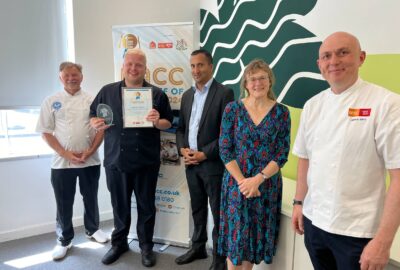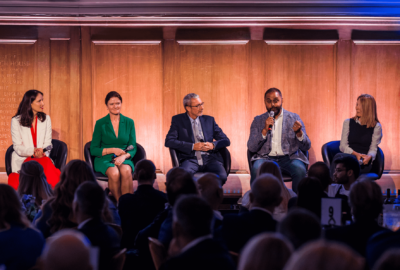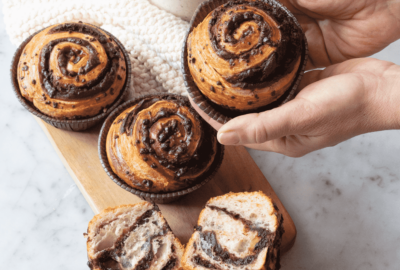Michael O’Hare is the chef-patron of the Michelin-starred Leeds restaurant, The Man Behind the Curtain. A former ballet dancer and aerospace engineering student, his wasn’t a direct career path into cooking…
Yours wasn’t a conventional journey into the chefing world. Why did you choose this route? I didn’t choose this route at all it just sort of happened. I think dropping out of higher education to become a chef is quite commonplace these days. The big problem in the UK is that kids are pushed to make a decision on a career at 16 before they know anything about life, what their interests are or what drives them. Three of my ‘chefferers’ have degrees in non-food related subjects. It’s a time when you first start to eat and drink alone as an adult. I think if everyone took three years after school to do some shitty joe jobs, learn work ethic and furthermore understand what they don’t want to do, then university would be much more beneficial. At the moment students use university to do exactly this… massive debts and no career path at the end of it, too much pressure to find your path when you’re a teenager rather than just letting life happen and your own self develop.
Do you think your lack of formal culinary education enabled you to unleash a creativity that would have been stifled otherwise? I don’t think it makes a difference whether you learn to cook in restaurants or learn to cook in catering college. There is certainly, depending on which restaurants you choose, better chefs in restaurants than there are lecturers in catering colleges. Although it’s not formal in terms of qualifications in a restaurant, you’re still learning. You can’t use the term ‘self-taught’ if you’ve ever worked for anyone else. I think by learning in a restaurant you’re learning people’s ways rather than the textbook way and it’s the people who you choose to work with that shape the way you cook.
Do you think there is a North/South divide when it comes to fine dining? Maybe… (Michael mused). It’s probably better to just single out London versus the rest of the UK. I think it’s more common to eat in fine dining restaurants on a casual basis in London. There is more disposable income and it’s not seen as a special trip necessarily. Fine dining in the north is far more occasion-led, not birthdays etc but going out and meaning it, this includes people coming outside of London to eat. We get as many people from the south at The Man Behind The Curtain as we do from the north. When I go to a restaurant in London it’s because I’m in London for another reason and whilst I’m there I want to eat great food. When people travel from London to The Man Behind The Curtain it’s usually just to eat at the restaurant. Any other activities are planned around it.
Do you enjoy your rebel/maverick moniker? To be honest I don’t think it exists. People may see me as a rebel but in reality, I’m just doing things the way that I want to. Labelling happens a lot and the media want to define things or people. Maybe it’s a by-product of doing what you want, when some chefs are doing what they think people want. I really like Maverick from Top Gun ….. even with the dodgy teeth still super cool.
How important is gaining Michelin stars to you? Incredibly. I don’t judge myself or others by them and I’m not blind to the fact that my opinions are different to that of Michelin. I think it’s important because they exist. Nobody agrees completely with any guide… and it is just that “a guide” its not a guarantee. Because other restaurants have them it becomes comparative which makes it competitive. You can draw a conclusion that a 3 star restaurant is better than a 2 star and in turn a 2 better than 1 and so on… It doesn’t mean that I haven’t been to better one stars than three stars, because I have but that is only my viewpoint. Still to this day there is no better or more internationally respected guide. As long as there are restaurants that have more accolades than you, then you can be compared to them but I am not in competition with other restaurants. I am just in competition with myself and I am a much bigger critic of my own work than any Michelin inspector. I genuinely believe the progression of The Man Behind The Curtain means we are now operating at a 2 Star level and that self-belief is good enough for me… if it comes it comes.
How do you make it work in your kitchens? Working in a kitchen is no different to any other working environment. A negative environment is induced and a positive environment just happens. I think it’s so important to just not be a dick and also to find the right people. There are a lot of chefs that wouldn’t fit in my kitchen and nearly all my chefs couldn’t work in any another kitchen. We work hard and we push forward but it’s mellow. You have to create an environment that people want to be in because, ultimately, it can be a repetitive job at times.
How important are the serving plates to the dining experience, and how involved are you with choosing/designing them? Every aspect of the restaurant has to fit its identity. That includes the music, the smell, the uniform, the cutlery, the crockery, the floor, walls, shoes, kitchen. I am 100% responsible with the choosing and design of the plates.
What do you predict will be the big food trends for the next 12 months? To be honest I don’t really care and I don’t think it makes any difference. I’ve heard that there is a big thing kicking off in the North East and in Sunderland especially about chicken dippers and blue drinks. Kitty cafes are popular and this could move to Alsatians in prams? There are rumblings that this could go nationwide.
How has becoming a father changed your outlook on work and life? It has made me want more out of life and more out of work. I don’t know if that’s as a direct result of becoming a father but I feel like I have more responsibility. I can directly influence the surroundings in which he grows up by what I do in my working life. I want to create a legacy with this restaurant so that, if he wants to get involved later in life, he can. There are only so many hours in the day, I want to spend as much time with my son as possible and I want the quality of time I spend with him to be better. I think the biggest change is that I fear death less. I used to be terrified of dying but I’m seeing parts of myself now in my son which brings comfort. I still don’t want to die but if I did I can take comfort in that he’ll be there. That got dark didn’t it …. Sorry ….I’ve always been a bit Peter Pan about life but now I’m quite into getting older.
And now for three questions that we ask all of our Leading Lights…
1. What are your three kitchen secrets?
i) Paint stuff black until people get bored of it
ii) Buy fancy plates so nobody notices you can’t cook
iii) Be a bit of a dick in interviews
2. What is your favourite ingredient and why?
Love… it’s all you need.
3. Please could you share your favourite recipe, along with your reasons for choosing it?
“Gulguk” Korean Oyster Soup – it’s light and refreshing but has the luxury of oysters to make it special. Go to www.stiritupmagazine.co.uk/recipes for the full recipe.



